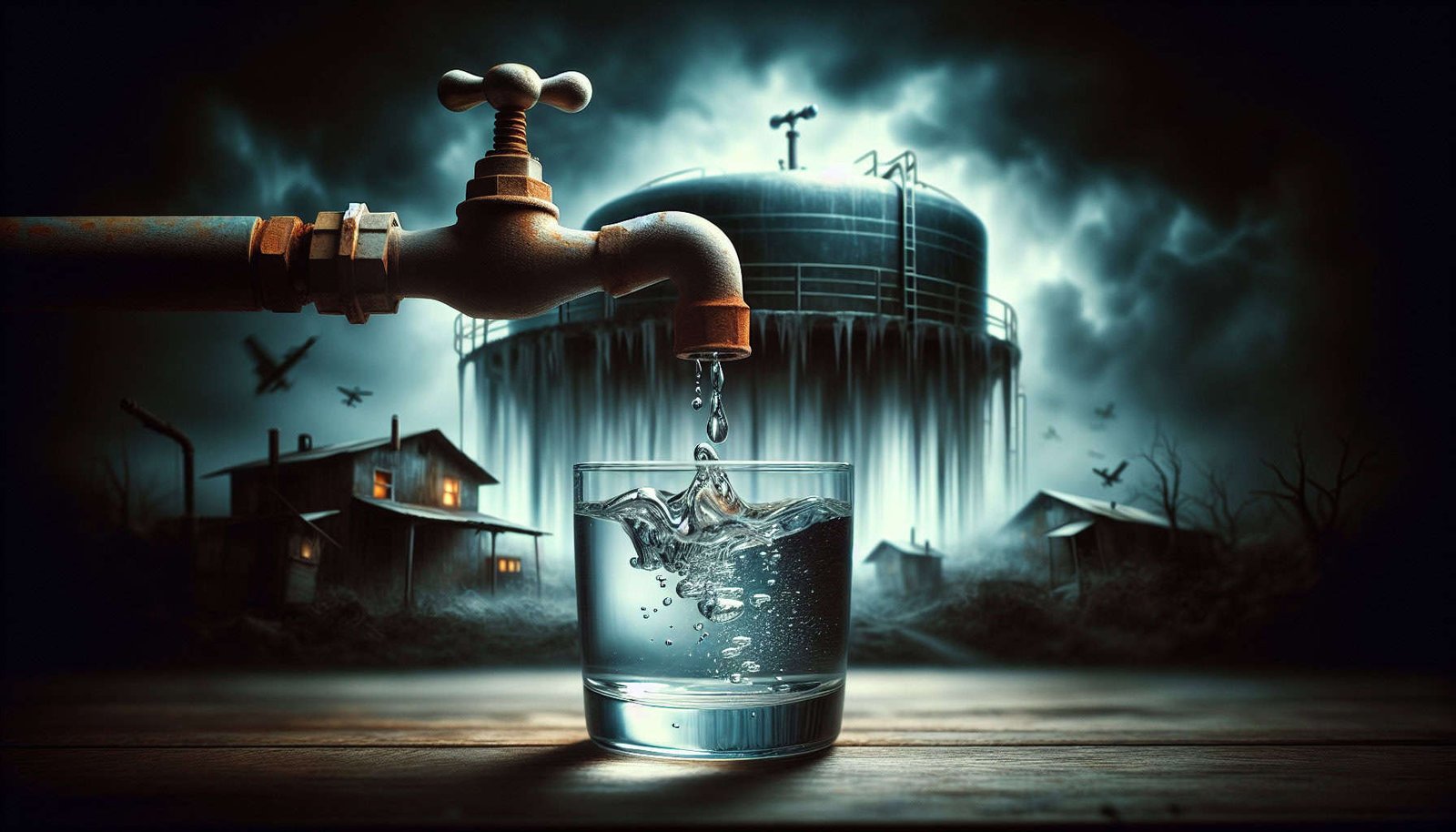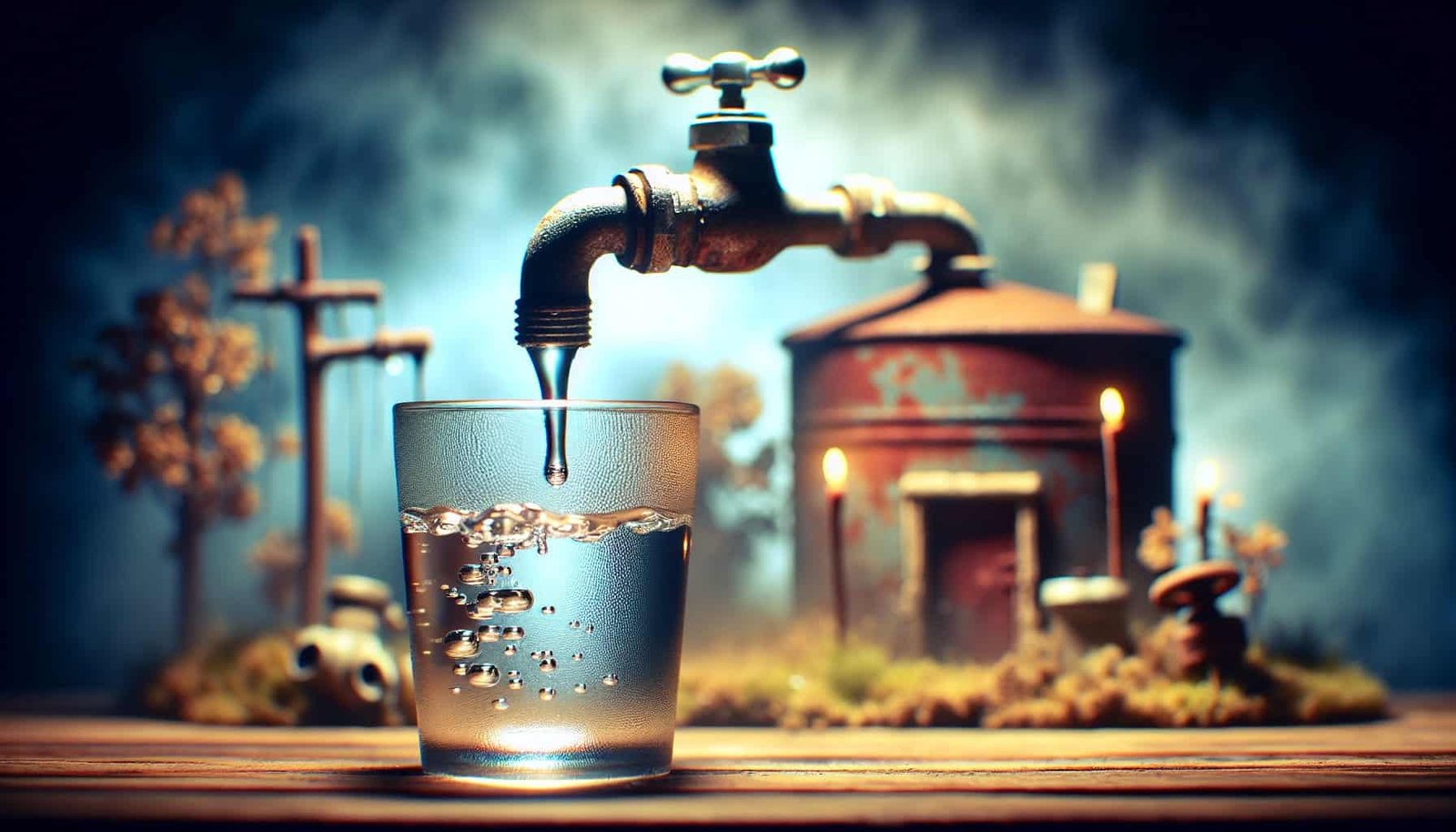If you rely on well water in regions where well water pressure tank maintenance records exist, it is important to be aware of the safety issues that can arise. Understanding these potential risks can help ensure that the water you and your loved ones consume is free from any harmful contaminants. By staying informed and taking necessary precautions, you can enjoy the benefits of well water while prioritizing your health and well-being.
Understanding Well Water Systems
Definition of Well Water
Well water is groundwater that is accessed through a well. It is obtained from underground sources such as aquifers and is commonly used for domestic, agricultural, and industrial purposes. Unlike water supplied by municipal systems, which go through extensive treatment processes, well water is often untreated and can contain naturally occurring minerals, organic matter, and potentially harmful contaminants.
Importance of Well Water Pressure Tanks
Well water pressure tanks play a vital role in well water systems. These tanks regulate the water pressure by storing water and maintaining a constant pressure level in the system. They provide a buffer between the well pump and the plumbing fixtures, ensuring a consistent and reliable supply of water. Without a pressure tank, the well pump would need to operate more frequently, leading to increased energy consumption, wear and tear on the pump, and potential system failures.
Overview of Well Water Systems
Well water systems consist of various components that work together to deliver water to a property. The main components often include the well itself, the well pump, pressure tanks, a distribution system, and often a water treatment system. The well pump draws water from the underground source and supplies it to the pressure tank. From there, the water is distributed to the plumbing fixtures throughout the property. Well water systems can vary in complexity, depending on the specific needs and regulations of the region.
Safety Concerns in Well Water Systems
Contamination Risks in Well Water
Well water is susceptible to contamination from various sources. Contaminants can enter the well through surface runoff, improperly constructed or sealed wells, nearby septic systems, agricultural activities, and even naturally occurring minerals and chemicals in the soil. Common contaminants found in well water include bacteria, viruses, nitrates, pesticides, heavy metals, and volatile organic compounds. Consuming contaminated well water can lead to various health issues, emphasizing the importance of regularly testing and treating the water.
Common Health Issues Related to Well Water
Drinking untreated or contaminated well water can pose significant health risks. Bacterial and viral infections, such as E. coli and Legionnaires’ disease, can occur when water is contaminated with fecal matter or other pathogens. Nitrates, which can seep into groundwater from agricultural fertilizers and septic systems, can be especially harmful to infants and pregnant women, potentially leading to a condition known as methemoglobinemia or “blue baby syndrome.” Other contaminants, such as arsenic and lead, can cause long-term health problems, including organ damage and developmental issues.
Dangers of Poorly Maintained Pressure Tanks
Neglected or improperly maintained well water pressure tanks can pose several safety hazards. Over time, pressure tanks can develop issues such as leaks, corrosion, or a loss of pressure. These issues can lead to decreased water quality and pressure, making it challenging to perform daily tasks that rely on a consistent water supply. Additionally, pressure tanks that are not properly maintained may rupture or burst, causing property damage and potential injuries. Regular maintenance and inspections are crucial to identify and address any issues before they escalate.

Well Water Pressure Tank Maintenance
Role of Pressure Tanks in Well Water Systems
Pressure tanks are essential components of well water systems. They store pressurized water, allowing the well pump to cycle less frequently and reducing strain on the pump motor. When water is needed, the pressure tank supplies the required pressure to the distribution system, ensuring an even flow of water to the taps. Properly maintained pressure tanks help prolong the life of the well pump, optimize energy efficiency, and maintain consistent water pressure throughout the system.
Regular Maintenance Requirements
To keep well water systems functioning optimally, regular maintenance of pressure tanks is necessary. This maintenance typically includes inspecting the tank for signs of damage, checking the pressure settings, cleaning or replacing the air bladder or diaphragm, and ensuring proper functioning of the pressure switch and relief valve. It is recommended to follow the manufacturer’s guidelines for maintenance and, if unsure, consult a professional well water service provider for assistance.
Signs of Pressure Tank Problems
Being aware of the signs indicating pressure tank problems can help prevent more significant issues from arising. Some common signs to look out for include fluctuating water pressure, air or water leaking from the tank, continuous running of the well pump, strange noises coming from the tank, or sudden decreases in water flow. If any of these issues are observed, it is crucial to address them promptly to avoid potential safety hazards and system failures.
Risks Associated with Neglected Pressure Tanks
Water Contamination and Microbial Growth
Neglected pressure tanks can become breeding grounds for bacteria and other microorganisms. Over time, organic matter and sediment can accumulate in the tank, creating an ideal environment for microbial growth. These microorganisms can contaminate the water supply, leading to health issues for those who consume it. Regular cleaning and disinfection of pressure tanks are essential to prevent the growth of harmful bacteria and maintain water quality.
Decreased Water Quality and Pressure
When pressure tanks are not properly maintained, water quality and pressure can suffer. Sediment, minerals, and other debris can build up inside the tank, which can be released into the water supply, causing discoloration, foul odors, and a decrease in water quality. Additionally, neglected pressure tanks may not hold the necessary pressure to provide consistent water flow, resulting in decreased water pressure throughout the system. Regular maintenance helps ensure the delivery of clean, high-quality water at optimal pressure levels.
Potential for Tank Bursting
If pressure tanks are severely neglected or damaged, there is a risk of the tank bursting. This can occur due to excessive pressure buildup or structural weaknesses in the tank. A bursting tank can cause significant property damage and pose a safety risk to individuals nearby. By regularly inspecting and maintaining pressure tanks, potential issues can be identified and addressed, reducing the likelihood of tank bursting and ensuring the safety and integrity of the well water system.

Water Testing and Treatment
Importance of Periodic Water Testing
Regular water testing is crucial for maintaining the safety and quality of well water. Periodic testing allows homeowners to identify any changes or contaminant levels that may pose risks to human health. Testing can help detect the presence of bacteria, viruses, nitrates, heavy metals, and other harmful substances. By understanding the quality of their well water, homeowners can take appropriate measures to treat and mitigate any potential issues.
Common Contaminants Found in Well Water
Well water can contain a variety of contaminants, depending on various factors such as location, surrounding land use, and geological conditions. Common contaminants found in well water include bacteria, viruses, pesticides, herbicides, volatile organic compounds, heavy metals (such as arsenic, lead, and mercury), nitrates, radon, and various minerals. Testing the well water can help identify the specific contaminants present and determine the most suitable treatment methods.
Effective Water Treatment Methods
Treating well water involves removing or reducing contaminants to safe levels. The appropriate treatment method depends on the specific contaminants found in the well water. Common treatment methods include filtration systems, reverse osmosis, UV disinfection, chlorination, and distillation. Filtration systems can remove sediment and larger particles, while reverse osmosis can effectively remove bacteria, viruses, and many chemicals. UV disinfection and chlorination can kill or inactivate microorganisms, and distillation can remove minerals and volatile organic compounds. Consulting with a water treatment professional can help determine the best treatment approach for a specific well water system.
Maintaining Well Water Quality
Protective Measures to Prevent Contamination
Preventing contamination is key to maintaining well water quality. Protective measures include properly constructing and sealing the well to prevent surface runoff and other contaminants from entering the water source. Wellheads should be raised above ground level and located away from potential contamination sources such as septic systems or chemical storage areas. Implementing best agricultural practices, such as managing fertilization and pesticide use, can also help minimize contamination risks. Additionally, regular testing, appropriate treatment, and regular maintenance of the entire well water system are essential to ensure optimal water quality.
Regular Cleaning and Disinfection
Regular cleaning and disinfection of well water systems are crucial to maintain water quality. This includes cleaning the pressure tank, removing any sediment or biofilm buildup, and disinfecting the tank and distribution system. Consultation with a professional well water service provider is recommended to ensure proper cleaning methods and the use of suitable disinfectants. Regular disinfection can help control bacterial growth and prevent contamination issues.
Proper Well Sealing and Construction
Well construction and sealing are critical factors in preventing contamination and ensuring the longevity of the well water system. Proper sealing prevents surface water from infiltrating the well and protects against potential pollutants. Well casings should be constructed and sealed according to local regulations and industry standards. Regular inspections by qualified professionals can identify any issues with the well construction or sealing and allow for timely repairs or improvements, maintaining the integrity and safety of the well water system.

Professional Well Water System Inspections
Benefits of Regular Inspections
Regular inspections of well water systems offer numerous benefits. Inspections can identify potential problems, such as leaks, contamination risks, or pressure tank issues, before they escalate into more significant and costly issues. Inspections help ensure compliance with local regulations and industry standards, protecting the health and safety of the well water users. They also provide an opportunity for homeowners to receive expert advice on proper maintenance, water treatment, and protective measures to enhance the longevity and efficiency of the well water system.
Qualifications of a Well Inspector
A qualified well water inspector possesses a combination of knowledge, experience, and appropriate certifications. They should be familiar with local regulations and industry standards, as well as the intricacies of well construction, water treatment methods, and pressure tank maintenance. Professionals certified by organizations such as the National Ground Water Association (NGWA) or the Water Quality Association (WQA) have demonstrated their expertise and commitment to upholding industry standards. It is advisable to hire a well inspector with suitable qualifications and a good reputation to ensure accurate assessments and reliable recommendations.
Components Checked During Inspections
During a well water system inspection, various components are checked to ensure proper functioning and compliance with regulations. These components include the wellhead, casing, filtration and treatment systems, pressure tanks, pumps, plumbing connections, and electrical wiring. Inspectors assess the condition and performance of each component, identifying any signs of damage or malfunction. They may also conduct water quality testing to determine the presence of contaminants. A comprehensive inspection report provides homeowners with valuable information to address any concerns and make informed decisions regarding maintenance or necessary repairs.
Legal Requirements for Well Water Systems
Overview of Local Well Water Regulations
Local well water regulations vary by region and aim to protect public health and the environment. These regulations typically outline requirements for well construction, sealing, permits, water quality testing, and reporting procedures. It is essential for well owners to familiarize themselves with the specific regulations in their area and ensure compliance with the necessary requirements. Consulting with local authorities or well water professionals can provide guidance on understanding and adhering to the applicable regulations.
Permitting and Reporting Procedures
Many regions require permits for well construction, modification, or abandonment. Permitting procedures typically involve submitting an application with detailed information about the well and its intended use. Additionally, some areas require regular reporting of well water quality testing results or other compliance documentation. Well owners should be aware of these procedures and any deadlines or documentation requirements. Failing to obtain permits or comply with reporting procedures can result in penalties and may compromise the safety and legality of the well water system.
Responsibilities of Well Owners
Well owners have specific responsibilities to ensure the safety and maintenance of their well water systems. These responsibilities often include regularly testing the water quality, maintaining pressure tanks and other components, addressing any identified issues promptly, and complying with local regulations. Well owners should also inform themselves about protective measures to prevent contamination, including maintaining proper well sealing and following best practices for land and water management. By fulfilling these responsibilities, well owners contribute to safeguarding public health and protecting water resources.

Finding a Reliable Well Water Service Provider
Researching and Choosing a Service Provider
When seeking a well water service provider, conducting thorough research is crucial. Start by seeking recommendations from friends, neighbors, or local authorities. Online directories and review platforms can also provide valuable insights into service providers’ reputations and customer satisfaction. Look for companies or professionals with significant experience in the industry, appropriate certifications, and licenses. Consider contacting multiple service providers to discuss their services, expertise, and pricing structure. Choosing a reliable and reputable service provider ensures quality workmanship and peace of mind.
Importance of Licenses and Certifications
Licenses and certifications are essential indicators of a well water service provider’s competence and professionalism. Well contractors and water treatment professionals should hold appropriate licenses, demonstrating their qualifications and adherence to local regulations. Certifications from reputable organizations such as the NGWA or the WQA further validate the expertise and commitment of the service provider. Verifying licenses and certifications can help ensure that the chosen provider possesses the necessary knowledge and skills to handle well water systems efficiently and safely.
Costs and Services Provided
When considering well water service providers, it is important to evaluate the costs and services offered. Some providers may specialize in specific aspects of well water systems, such as well construction, pump installation, or water treatment. Others may offer comprehensive services, including inspections, maintenance, and water testing. Obtain detailed quotes from multiple providers, asking about all associated costs, warranties, and potential additional charges. It is advisable to choose a service provider offering a range of services and transparent pricing that fits within the budget while meeting the specific needs of the well water system.
Educating Yourself About Well Water Systems
Accessing Local Well Water Resources
Local resources dedicated to well water systems can offer valuable information and support for well owners. Many regions have government offices, health departments, or water management agencies that provide educational materials, guidelines, and resources on well water maintenance, treatment, and regulations. Online platforms or community websites may also provide access to articles, forums, or FAQs addressing common questions and concerns related to well water systems. Take advantage of these resources to empower yourself with knowledge and make informed decisions about your well water system.
Community Programs and Workshops
Community programs and workshops provide opportunities for well owners to learn from experts and interact with other members facing similar challenges. These initiatives, often organized by governmental agencies, nonprofit organizations, or universities, focus on educating well owners about well water management, proper maintenance practices, and water treatment options. Participating in these programs can enhance your understanding of well water systems, foster community engagement, and empower you to take proactive steps in maintaining the safety and quality of your well water.
Continued Learning for Well Owners
Well water systems and regulations are continually evolving, making continued learning essential for well owners. Stay updated on advancements, new treatment methods, and changes to regulatory requirements through professional publications, industry journals, and online resources. Attend workshops, seminars, or conferences specific to well water systems to keep abreast of the latest practices and technological advancements. By continuing to educate yourself, you can ensure that your well water system remains safe, efficient, and compliant with current standards.
In conclusion, understanding well water systems and prioritizing their safety is crucial for homeowners relying on well water. Well water pressure tanks play a vital role in maintaining a consistent water supply, but they require regular maintenance to prevent safety hazards and ensure optimal system performance. Well water testing and treatment are also essential to protect against potential health risks associated with contaminants. By maintaining well water quality, implementing protective measures, and following legal requirements, well owners can safeguard their water supply and the well-being of their households. Choosing reliable well water service providers and continually educating oneself about well water systems further promotes the longevity and efficiency of these systems.


